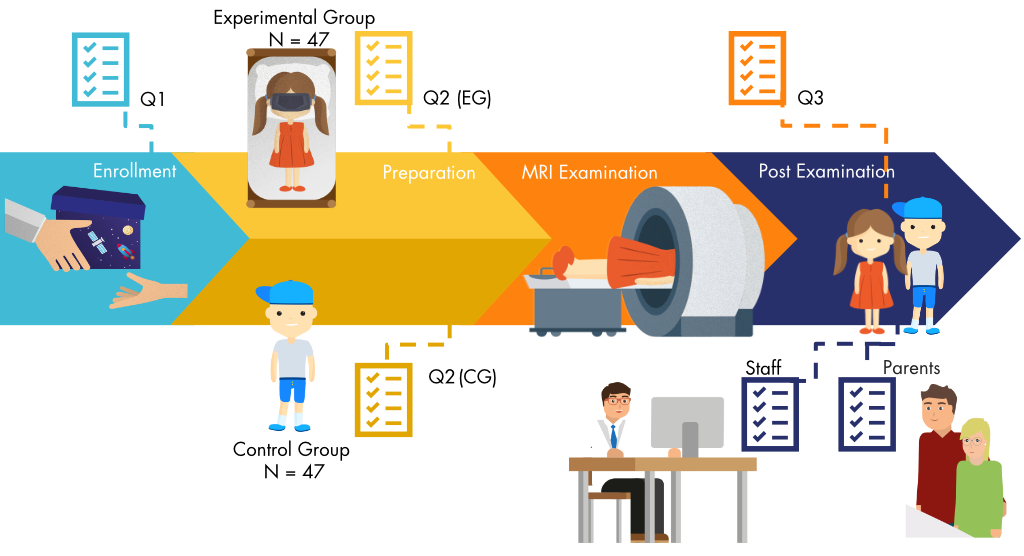RESEARCH
The Pengunaut Trainer is the result of collaborative, interdisciplinary work between researchers and students from the University of Duisburg-Essen, medical professionals, psychologists from the University Hospital Essen, and representatives from the entertainment and medical technology industries. At the beginning of the project, the focus was on finding ways to improve children’s health care and support the emotional well-being of young patients. The Pengunaut Trainer is therefore both result and object of scientific research. The concept, content and technical implementation, as well as the empirical evaluation of the intervention, are based on scientific principles, theoretical considerations and – thanks to close interdisciplinary cooperation – practical success models. To present all facets and results of the project on this website would go beyond the scope. Therefore, please refer to our scientific publications. A detailed and complete description of the project, its methodology and results can also be found in Dr. Stefan Liszio’s doctoral thesis.
Evaluation
To investigate whether the Pengunaut Trainer is an effective method of reducing anxiety and stress in children before and during MRI scans, we conducted a study at the University Hospital in Essen and the Children’s Hospital in Cologne (both hospitals are located in Germany) with almost 100 children. The following is a summary of the most important facts about the study and our results. You can find more detailed information in our scientific publications (see below).
Study Protocol

47 children in the Pengunaut Trainer group trained independently with the app over an average period of 14 days. The 47 children in the control group were prepared for the examination according to the clinic standard. During the preparation phase and before and after the MRI scan, the emotional experience of the patients was measured using questionnaires (PANAS, STAIK). In addition, in-game data such as frequency of use, individual ratings of each mini-game and physical movements in the virtual MRI were recorded.
Results
Our results suggest that using the Pengunaut Trainer to prepare children for their MRI scan is an effective way to reduce anxiety and negative feelings both before and during the scan. Furthermore, children who had trained with the app had more positive feelings about the MRI than children who had not been prepared with our intervention. In addition, we observed a significant relationship between the frequency of training – that is, the frequency with which the children practised the virtual MRI scan – and the reduction in negative feelings in anticipation of the real MRI scan. In other words, children who practised more often with the Pengunaut Trainer were less anxious about the MRI in anticipation of the examination. Although the number of patients who experienced high levels of anxiety during the scan was reduced by the Pengunaut Trainer, some children may still find the actual MRI scan uncomfortable. Nevertheless, the experience of positive feelings was promoted in more patients than in the control group.
The children in our study were very positive about the idea of the courage forumluas. However, they sometimes found it difficult to remember the chosen formula to use it during the MRI scan. Nevertheless, we found a positive correlation between recall of the courage formula and experienced positive feelings during the scan. We also have anecdotal reports from young patients who have used their formula in other threatening medical situations, such as chemotherapy, and reported feeling less anxious.
Based on our findings, we can confidently say that the Pengunaut Trainer is an effective and successful method of preparing children for MRI scans and reducing their feelings of anxiety and stress. Our intervention improves the young patients’ well-being and willingness to cooperate. Parents and radiologists also found the intervention helpful and enjoyable.
This section presents only a brief, highly simplified report of our findings. A detailed evaluation of our study can be found in Liszio, Graf, Basu and Masuch (2020) and in Liszio (2021).
Publications
We would like to share our findings and knowledge from the development and use of our app with anyone who is interested. As part of our research, we have presented and published papers at scientific conferences documenting our work and findings. These articles have undergone rigorous scientific peer review and can be downloaded free of charge for personal use from the links below.
Oliver Basu, Stefan Liszio, Linda Graf, Bernd Schweiger, Martin Stenzel and Maic Masuch. 2022. Der Pingunauten Trainer – Spielerisches Training zur MRT-Vorbereitung mit Virtual Reality. Poster. Kongress für Kinder- und Jugendmedizin 2022, Düsseldorf, Deutschland, September 07-10. DOI: 10.13140/RG.2.2.13466.52162 (Best Poster-Award)
Open Access via ResearchGate.
Stefan Liszio. 2021. Relaxation, Distraction, and Fun: Improving Well-being in Situations of Acute Emotional Distress with Virtual Reality. Dissertation. Universität Duisburg-Essen, Fakultät für Ingenieurswissenschaften. DOI: 10.17185/duepublico/74774
Stefan Liszio, Linda Graf, Oliver Basu and Maic Masuch. 2020. Pengunaut Trainer: A Playful VR App To Prepare Children for MRI Examinations – In-depth Game Design Analysis. In: Proceedings of the Interaction Design and Children Conference (IDC ’20), London, United Kingdom, June 21-24, pp. 470–482. DOI: 10.1145/3392063.3394432
Open Access via ResearchGate, ACM DigitalLibrary
Stefan Liszio and Maic Masuch. 2017. Virtual Reality MRI: Playful Reduction of Children’s Anxiety in MRI Exams. In: Proceedings of the 2017 Conference on Interaction Design and Children (IDC ’17). Association for Computing Machinery, New York, NY, USA, 127–136. DOI: 10.1145/3078072.3079713
Open Access via ResearchGate, ACM DigitalLibrary